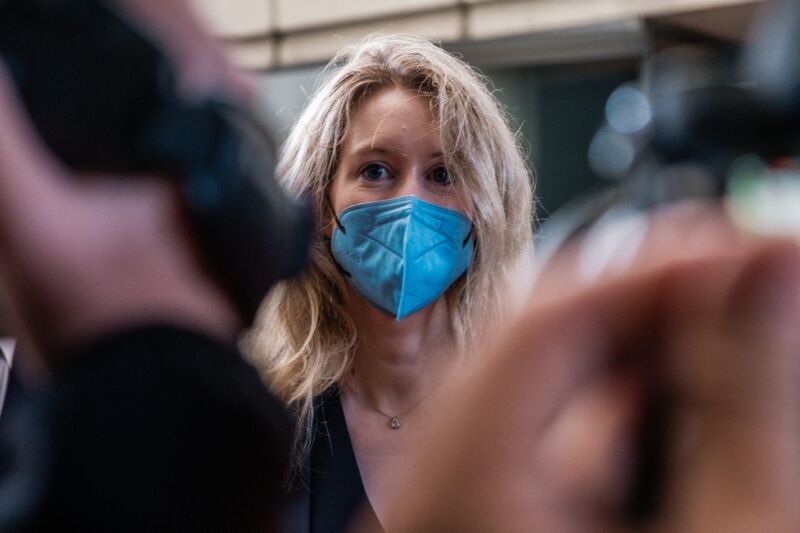
In 2006, Alan Eisenman invested more than $1 million in Theranos, a then-promising medical diagnostic company founded by college dropout Elizabeth Holmes. Holmes had told him that her company was talking with Morgan Stanley about an IPO in 12–18 months and that the company would bring in $200 million in revenue by 2008.
For years, Eisenman and Holmes were in frequent communication, including quarterly calls with other investors and one-on-one conversations. He was impressed that the company had contracts with a number of pharmaceutical companies, including Pfizer and Novartis, and believed in its mission.Eisenman is a retired financial planner from Texas, and he took the stand yesterday in Holmes’ criminal trial. Holmes is being charged with ten counts of wire fraud and two counts of conspiracy to commit wire fraud. Eisenman’s investment is one of the counts of wire fraud. For him, Theranos’ shine tarnished in 2010 when communications from Holmes and Theranos “dropped to zero,” Eisenman said.
He grew suspicious. “There was no information coming from the company. To me, that’s a sign of trouble,” Eisenman said.
One investor’s persistence
That didn’t stop him from trying to get more detail. Eventually, Holmes replied that she couldn’t give Eisenman the information he wanted. She offered to buy him out, saying that he would receive “greater than five times” his initial investment. Eisenman replied with yet more questions, but Holmes never replied. Still, he persisted in asking for more information, emailing Holmes and Theranos’ chairman, only to be brushed off.
Then, in 2013, Theranos’ tone changed. The company emailed him, saying that it was “rapidly scaling to establish a national footprint” and that it was soliciting investments. Eisenman emailed Ramesh “Sunny” Balwani, the company’s COO, saying he was thinking of investing another $1 million. Balwani quickly replied, saying that he was available to talk any time. To Eisenman, the sudden openness was a complete change from Balwani’s previously “hostile” and “aggressive” communications with him.Ultimately, Eisenman decided in 2013 to invest around $100,000, because, as an early seed investor, he had a “seat at the table” and thought that Theranos had finally turned things around. He assumed his money would be used to scale-up operations.
After the 2013 investment, though, Eisenman grew frustrated again. He repeatedly asked for more information, and finally, Balwani asked him to stop emailing. In 2015, when Eisenman wanted to liquidate his shares, he emailed Holmes and Balwani with a subject line reading, “PLEASE RESPOND!!!”
His note said, “It’s really unfair for you to play this cat and mouse game with me... I can’t make a rational decision to settle or hold my stock with the lack of info you have provided.”
Balwani replied one last time, saying, “Your emails are insulting, full of inaccurate statements and wasteful of our time. Our next response to this email and all your future emails will come from our counsel.” Eisenman wasn’t able to liquidate his shares and presumably lost his entire investment when the company dissolved in 2018.
In cross-examination, Holmes’ attorney Lance Wade pointed out that in a previous deposition, Eisenman acknowledged his contract with Theranos didn’t grant him access to any company information. Wade also noted that his contract didn’t guarantee an IPO. “What’s more important is the conversations with principals,” Eisenman said.
“More bad news”
The day in court began with the cross-examination of Kingshuk Das, Theranos’ fourth and final lab director. Das was hired in December 2015, shortly after a federal audit of the company’s lab—which no one at Theranos mentioned until he started work. As he started revamping things, though, he said that Holmes was supportive of his efforts to turn the lab around. Das was the first lab director to report to Holmes directly. All others had reported to Balwani.
In the course of Wade’s cross-examination of Das, jurors saw one of his emails to Holmes. The subject read, “More bad news, sorry”—he was concerned about HIV tests that the company was running on third-party equipment. He suggested that Theranos stop running the tests, along with others being run in the “BUGS lab.” (It’s unclear what “BUGS” stood for.) Das said that Holmes supported this decision, too.Wade’s line of questioning seemed to suggest that once Holmes was in control, she started cleaning up the mess left by Balwani. But by this point, she had little choice. After the disastrous inspection in November 2015, federal regulators at the Centers for Medicare and Medicaid Services were considering shutting down the lab entirely. That would have prevented Holmes and Balwani from working in the blood-testing business for two years.
Das’ testimony ended on a poetic, albeit awkward, note—Wade asked him about his favorite quote from the film The Best Exotic Marigold Hotel, which he apparently mentioned in a meeting at Theranos. The quote: “Everything will be all right in the end, and if it’s not all right, it’s not yet the end.”
It’s not clear what Wade was driving at, but Das’ time at Theranos ended in 2018 when he was laid off shortly before the company was dissolved.
reader comments
79